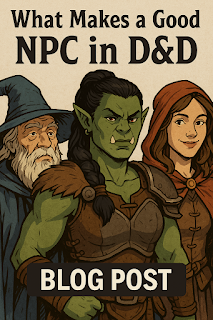What Makes a Good NPC in Dungeons & Dragons?
By Charlie Stayton, Behind the Die
Non-player characters (NPCs) are the lifeblood of any Dungeons & Dragons campaign. They add depth, flavor, and immersion to the world. A well-crafted NPC can transform a mundane encounter into a memorable moment, inspiring players and enriching the narrative. But what exactly makes an NPC truly great? Let's dive into the key elements that elevate NPCs from simple quest-givers to unforgettable personalities.
1. A Distinctive Personality
A good NPC should feel like a real person (or creature) with their own motivations, quirks, and goals. Whether it’s a gruff blacksmith with a soft spot for poetry or a goblin merchant who talks in rapid-fire riddles, strong personalities make interactions engaging and fun.
2. Clear Motivations & Goals
Every NPC should have a reason for their actions, even if the players never learn it directly. Whether they’re driven by greed, love, revenge, or a sense of duty, their motivations should inform their behavior and dialogue. A town guard who secretly wants to become a bard will interact differently than one who’s fiercely loyal to the city’s ruler.
3. Memorable Voices & Mannerisms
Distinctive speech patterns, catchphrases, or unique physical traits can make an NPC stand out. A noble who ends every sentence with “as it were” or a rogue who always keeps one hand on their coin pouch adds a layer of authenticity to the roleplaying experience.
4. Ties to the World & the Players
NPCs shouldn’t exist in a vacuum. Connecting them to the setting and the player characters helps make them feel more natural. Maybe they’re an old war buddy of a PC or share a dark secret with a local noble. These connections create opportunities for deeper engagement.
5. Room for Growth
The best NPCs evolve with the story. Maybe the rival bounty hunter slowly becomes an ally, or a skeptical priest starts believing in the party’s cause. Dynamic NPCs keep the world feeling alive and responsive.
6. Unpredictability & Depth
Not every merchant is honest, and not every villain is purely evil. Giving NPCs layers of complexity makes them more interesting. Perhaps the seemingly cold-hearted assassin is actually protecting an orphanage, or the generous innkeeper is secretly feeding information to the local thieves’ guild.
7. Opportunities for Meaningful Interaction
A great NPC isn’t just someone players talk to; they should affect the game in meaningful ways. Whether it’s providing valuable knowledge, requesting the party’s help, or even betraying them at a crucial moment, NPCs should serve as more than just set dressing.
Bringing It All Together
Crafting engaging NPCs requires a blend of creativity, improvisation, and storytelling. Next time you introduce a new character to your game, ask yourself: Would I remember this NPC if I were a player? If the answer is yes, then you’ve likely struck gold.
What are some of your favorite NPCs from your campaigns? Share your stories in the comments below!t




Comments
Post a Comment